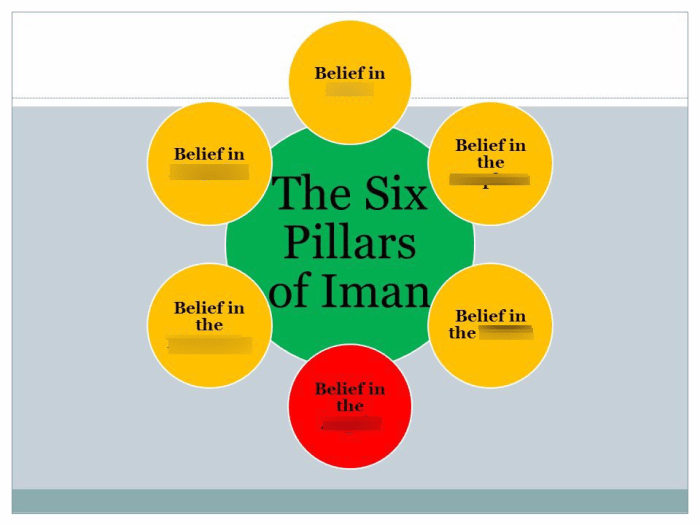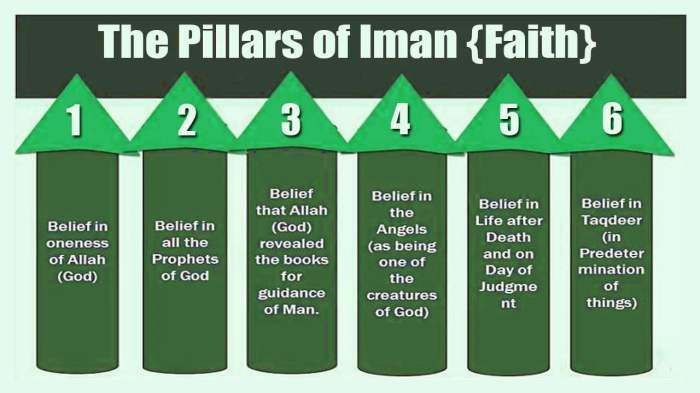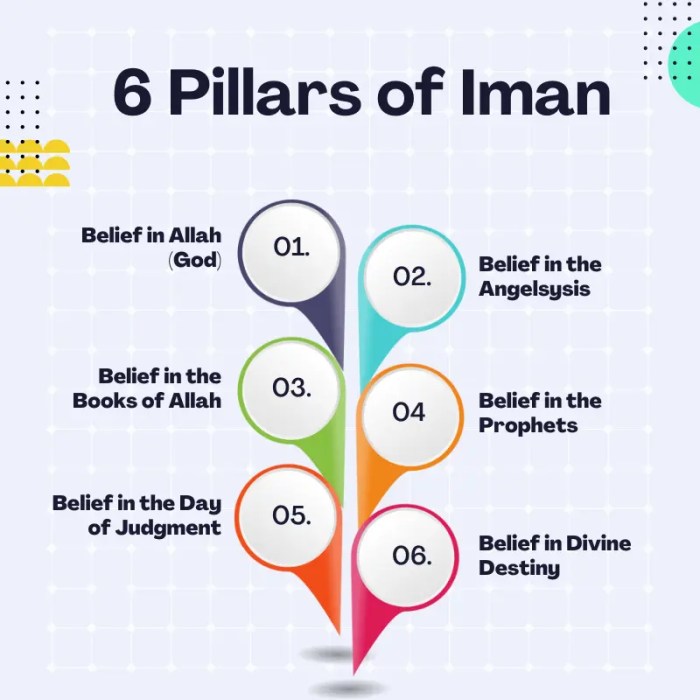The six pillars of iman form the bedrock of Islamic belief, providing a comprehensive framework for understanding the nature of God, the universe, and humanity’s place within it. From the fundamental belief in Allah to the anticipation of the Day of Judgment, these pillars shape the lives of Muslims worldwide, offering guidance and inspiration.
Each pillar represents a crucial aspect of faith, revealing the multifaceted nature of Islam. Belief in Allah underscores the monotheistic foundation of the religion, while belief in angels acknowledges the existence of celestial beings who serve as intermediaries between God and humankind.
The belief in books highlights the importance of divine revelation, as exemplified by the Quran, while belief in prophets emphasizes the role of messengers in conveying God’s message.
Pillars of Iman

Iman, or faith, in Islam is the foundation upon which the religion is built. It represents an individual’s unwavering belief and submission to Allah, the one and only God, and encompasses acceptance of the prophets, angels, divine scriptures, predestination, and the Day of Judgment.
The six pillars of iman provide a comprehensive framework for understanding the core beliefs of Islam and serve as essential tenets that guide a Muslim’s faith and practice.
Belief in Allah, The six pillars of iman
This pillar affirms the belief in Allah as the sole creator, sustainer, and ruler of the universe. Muslims believe that Allah is omnipotent, omniscient, and possesses all attributes of perfection. They recognize that He is the source of all blessings and guidance and that everything in existence is subject to His will.
Belief in Angels
The second pillar recognizes the existence of angels, celestial beings created from light who carry out Allah’s commands. Muslims believe that angels play a vital role in the functioning of the universe, conveying divine messages, protecting believers, and recording deeds.
Belief in Divine Scriptures
This pillar emphasizes the belief in the divine origin of the holy scriptures revealed to prophets throughout history. Muslims hold the Quran as the final and most complete revelation from Allah, containing guidance and teachings for all aspects of life.
Belief in Prophets
The fourth pillar affirms the belief in the prophets sent by Allah to guide humanity. Muslims believe that Muhammad is the last and most significant prophet, entrusted with the responsibility of conveying the final message to humankind.
Belief in the Day of Judgment
This pillar underscores the belief in a final day when all individuals will be held accountable for their actions and deeds. Muslims believe that on this day, Allah will judge each person based on their faith and actions, determining their eternal destiny.
Belief in Predestination
The sixth pillar acknowledges the belief in predestination, or qadar. Muslims believe that Allah has knowledge of all events that will occur and that everything happens according to His will. However, this belief does not negate the concept of free will, as individuals are responsible for their choices and actions.
Belief in Allah

Believing in Allah as the one and only God is the foundation of Islam. It is the most important pillar of iman and the basis for all other beliefs and practices.Allah is the creator and sustainer of the universe. He is all-powerful, all-knowing, and all-merciful.
He is the source of all good and the protector from all evil.The attributes of Allah are reflected in the world around us. The order and beauty of nature testify to His power and wisdom. The diversity of life on Earth shows His creativity.
And the human capacity for love and compassion reflects His mercy.
Attributes of Allah
Allah has many attributes, including:
- Al-Rahman (the Most Merciful)
- Al-Rahim (the Most Compassionate)
- Al-Malik (the King)
- Al-Quddus (the Holy)
- Al-Salam (the Peace)
- Al-Mu’min (the Faithful)
- Al-Muhaymin (the Guardian)
- Al-‘Aziz (the Mighty)
- Al-Jabbar (the Compeller)
- Al-Mutakabbir (the Proud)
These attributes show us that Allah is a loving and compassionate God who is also powerful and just. He is the one who created us and sustains us, and He is the one to whom we will return on the Day of Judgment.
Belief in Angels

Angels are ethereal beings created by Allah from light. They are described as having wings and possessing immense power and intelligence. Angels play a crucial role in the Islamic belief system, serving as messengers, protectors, and executors of Allah’s will.
Roles of Angels
Angels are responsible for various tasks in the universe, including:
Revelation
Angels convey Allah’s revelations to prophets and messengers.
Protection
The six pillars of iman, or articles of faith, are the core beliefs of Islam. They include belief in God, angels, prophets, scriptures, the Day of Judgment, and predestination. These beliefs form the foundation of Islamic faith and guide Muslims in their daily lives.
Just like the eight cows that Johnny Lingo offered for his beloved wife in the classic story Johnny Lingo 8 Cow Wife , these six pillars are essential for a strong and unwavering faith in Islam.
Angels guard and protect humans from harm, both physically and spiritually.
Recording
Angels record every human’s actions and deeds in the Book of Deeds.
Support
Angels provide support and assistance to those who strive to follow Allah’s path.
Intercession
Angels may intercede on behalf of humans who seek forgiveness and mercy from Allah.
Interaction with Humans
Angels interact with humans in various ways, though they are usually invisible to the naked eye. Some ways in which angels may manifest include:
Dreams
Angels may appear in dreams to deliver messages or guidance.
Visions
In rare cases, angels may appear in physical form to certain individuals.
Inspiration
Angels may inspire humans with good thoughts and actions.
Protection
Angels may intervene to protect humans from danger or harm.The belief in angels is an essential aspect of Islamic faith. Angels serve as a reminder of Allah’s presence and power, and they provide comfort and support to believers in their journey towards Allah.
Belief in Books
Divine revelation is essential in Islam, providing guidance and instructions for mankind. Throughout history, Allah has revealed sacred books to chosen prophets, each serving as a testament to His will and message.
The Quran
The Quran, revealed to Prophet Muhammad (PBUH), is the final and most complete revelation from Allah. It contains the core teachings of Islam, including beliefs, practices, and ethical principles. The Quran is believed to be the verbatim word of God, preserved in its original Arabic form.
Belief in Prophets: The Six Pillars Of Iman

Prophets play a pivotal role in Islam, serving as conduits through which God’s message is conveyed to humanity. They are chosen individuals entrusted with the responsibility of guiding people towards the righteous path and disseminating divine revelations.Throughout Islamic history, numerous prophets have emerged, each with a specific mission and message tailored to the needs of their respective time and place.
These prophets have been instrumental in shaping the moral, ethical, and spiritual landscape of the world, inspiring countless individuals to embrace a life of faith and devotion.
Qualities and Characteristics of Prophets
Prophets are distinguished by their exceptional qualities and characteristics, which set them apart from ordinary mortals. These include:
-
-*Truthfulness (Sidq)
Prophets are known for their unwavering commitment to truth and honesty. They convey God’s message without distortion or alteration, ensuring its purity and authenticity.
-*Trustworthiness (Amanah)
Prophets are entrusted with the responsibility of safeguarding God’s message and delivering it to humanity. They are known for their integrity and reliability, fulfilling their mission with utmost sincerity and devotion.
-*Conveying (Tabligh)
Prophets are messengers of God, tasked with conveying His message to the world. They do so through various means, including preaching, writing, and personal example.
-*Intelligence (Fathanah)
Prophets are endowed with exceptional intelligence and wisdom, enabling them to comprehend and interpret God’s revelations. They possess a deep understanding of human nature and the complexities of the world.
Belief in the Day of Judgment

The Day of Judgment, also known as the Day of Resurrection, is a central tenet of Islamic belief. It is the day when all of humanity will be resurrected and judged by Allah for their actions in this life.According to Islamic tradition, the Day of Judgment will begin with the blowing of a trumpet, which will cause the earth to tremble and the mountains to crumble.
The dead will be raised from their graves and gathered on a vast plain. They will be judged by Allah, who will determine their fate based on their deeds. Those who have lived good lives will be rewarded with paradise, while those who have lived evil lives will be punished in hell.
The Consequences of One’s Actions
The Day of Judgment is a reminder that every action we take in this life has consequences. We will be held accountable for our choices, both good and bad. This is why it is so important to live our lives in accordance with Allah’s will.
By doing so, we can increase our chances of being rewarded with paradise on the Day of Judgment.
Belief in Divine Decree

Belief in divine decree (qadar) is an essential part of Islamic faith. It involves the belief that everything that happens in the universe, both good and bad, is ultimately decreed by Allah.
Qadar is not to be confused with fatalism, which implies that humans have no free will and are merely puppets of destiny. In Islam, humans are given the power of choice and are held accountable for their actions. However, the outcome of our actions is ultimately in the hands of Allah.
Relationship between Qadar and Human Free Will
The relationship between qadar and human free will is a complex one that has been debated by Islamic scholars for centuries. Some scholars argue that humans have complete free will, while others believe that our choices are predetermined by Allah.
The majority view in Islam is that humans have free will, but that this will is limited by the divine decree. We are free to make choices, but the ultimate outcome of our choices is in the hands of Allah.
Question Bank
What is the significance of the six pillars of iman?
The six pillars of iman are fundamental beliefs that define Islamic faith and provide a framework for understanding the relationship between God, humanity, and the universe.
How do the six pillars of iman shape Muslim life?
The six pillars of iman guide Muslims in their daily lives, influencing their actions, beliefs, and aspirations. They provide a moral compass and a source of inspiration for living in accordance with God’s will.
What are the key attributes of Allah, as described in the six pillars of iman?
The six pillars of iman emphasize Allah’s oneness, omnipotence, omniscience, and other attributes that define His divine nature.